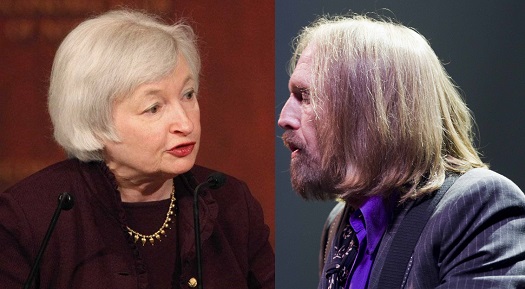Who doesn’t love Tom Petty?
I realize that what I’m about to discuss is not a glib and lighthearted topic for most of you out there. Largely because of the reasons I discussed here six months ago, involving retirement accounts and how you have been told to invest them all in the stock market and that the market always and only goes up. Last Friday, when the market plunged over 530 points the day after losing 357 points, NPR’s lead for the radio story was “Well, it’s a bad day to check your retirement account.” The ubiquitous penetration of market investment into these long-term “savings” instruments has only gotten more intricate since 2008. And it’s created a perverse incentive wherein most of the working core of society cares much more about the fate of corporate America and its top dogs than they should, because they see their ability to retire as wrapped up in the success of these multi-billionaires and their ventures.
It’s arguably an even more insidious and effective scheme than student-loan debt convincing a generation of young Americans to sell out rather than pursue their passions. At every stage of life, there’s now an American financial instrument guaranteed to make you prioritize the needs of the big corporation above those of your own moral compass or even personal financial fate. It’s all quite clever.
I happen to not have much in a retirement account, having cashed out what I could long ago and still trying to find a way to get the rest out before the alleged earliest date I can collect, currently slated as 20 February 2039. And no more than 5% of it was ever in stocks, and it certainly hasn’t been there in quite a while. Just as full disclosure of my own positions, which is good practice for anyone posting about the market, with or without giving advice.
Here’s the thing. People always try to explain what’s going on with the market and why things are happening or not. And most financial experts will tell you that the daily effort to attribute major swings in the market to one or maybe two key news events that day are only slightly more accurate than tea leaves. The market is complex, varied, over-leveraged, and unpredictable. To say “the market went down today on China fears” is not the same as saying a baseball team won because their star homered twice and the pitcher threw a shutout. It’s a little more like saying that the team won because 34,000 fans showed up. Like, yes, the fans may have helped the team win. But as the Orioles proved in April, you don’t need fans at all to win a home game.
But to the extent that what now seems by all measures to become at least a three-day slow-crash of the market can be attributed to any one thing, I think it’s best described as a giant tantrum. China, as they say, is just a red herring. Get it?
To the extent that there’s been a recovery in the United States economy in the last seven years, it’s been driven by an enormous transfer of wealth from the bottom 95% of Americans to the top 5%. The bailout was a giant metaphor for this kind of response to the Great Recession, but while income has stagnated and real employment has lagged, corporations have soared by cutting costs (wages, mostly), increasing productivity (longer hours and worse working conditions, mostly), and raking in financial incentives from the government (zero interest, mostly). While the stock market has been transformed to make us believe that it is a leading indicator of the health of the economy writ large, it is no such thing. It is an indicator of exactly what it indexes: the health and profitability of the largest and most successful corporations in society. And while an effort has been made to close the loop on this circular reasoning and make us all “shareholders” so we all feel (and are!) invested in the outcome of these corporations, most of us make most of our money from actual salaries rather than whatever extra we have to give back to companies. So our actual economic health derives from our own bottom line and not the company’s.
The problem with zero interest is that it all but guarantees that we all see the world through this corporate-driven lens rather than one of personal economic rebuilding. When I was growing up, I was taught to save and not to invest in the market. Because interest was around 5% and, as Albert Einstein allegedly used to say, “compound interest is the most powerful force in the universe.” As long as there have been financial instruments and economies, there’s been an assumption money saved will pay off over time. Which is why it’s so bizarre that people have described our present economy as recovering and healthy when you haven’t been able to conjure more than 1% interest from a savings account anywhere in approaching a decade. Despite what your state’s pension fund tells you, the stock market is not a savings account. It only feels that way because you are buying the rhetoric about the market’s unending meteoric rise and you can’t really stomach the idea of “making” 0.1% when inflation feels like it’s 25% on most everything you buy (except, perhaps, these days, gas).
So we’ve had a zero-interest world for a long time, simultaneously convincing the public that the stock market is the only viable place for their money and convincing corporations they don’t need to work to make money, because endless amounts of it are available free at the window. No wonder the corporate economy is booming! Any business can functionally print money for itself, just like the Federal Reserve itself. What’s not to love?
Well, the end of that reality is what’s not to love. Enter the tantrum.
Sure, China’s growth is only 7%. I guess that’s heartbreaking for people who felt that the country of over a billion people was going to generate better-than-Madoff returns forever. But analysts are, believe it or not, smarter than that. This has been foreseen. The skyrocketing growth that comes with a neo-industrial-revolution was never going to go on forever.
But the market really believes that free money, zero interest, can be the new reality forever. And they’re trying to take the Fed and new Chair Janet Yellen hostage.
I think that most market movers are making a play. They believe that if they can get the Dow Jones below 15,000 by the Fed meeting, she and her fellow Fed voters will have no choice but to promise to keep the free money flowing for the next year or so.
And before you think that my eye on the market is too heavily influenced by my own experience playing poker, I’ll counter with this: is there a difference? One of them is speculative gambling, a world of bluffs, calls, wins, losses, huge swings of money, the ability to read and predict the actions of others and react accordingly. The other is played in a casino with a deck of cards.
The market is bluffing, kids. They’re going all-in on free money.
Now don’t get me wrong. It’s possible that the entire pyramid scheme of the market, the illusion of the recovery, the enormous success of corporations and their big-money backers, is 100% dependent on 0% interest. It’s possible that this is only a semi-bluff, that they’re trying to manipulate the market so interest rates stay at rock-bottom, but they really are terrified to find out their worth in a world of even 0.5% interest. After all, the reasonable valuation for the Dow Jones is probably closer to 12,000 than 18,000. Unless, as I’ve observed before, you believe that not only has the economy recovered, but it’s the best economy that has ever been in this country by about 10-15%. Even the happiest true believers in this economy don’t believe that.
Regardless of which, I think it’s hard to imagine a scenario in which the market touches 18,000 again for a very long time. I humbly suggest you factor that into your own financial planning. The one exception will be if this stunt works and Yellen and friends capitulate and promise in September to leave the rate at zero indefinitely. Then the market will be at 19k by Christmas.



